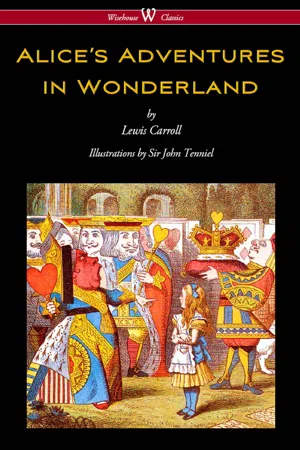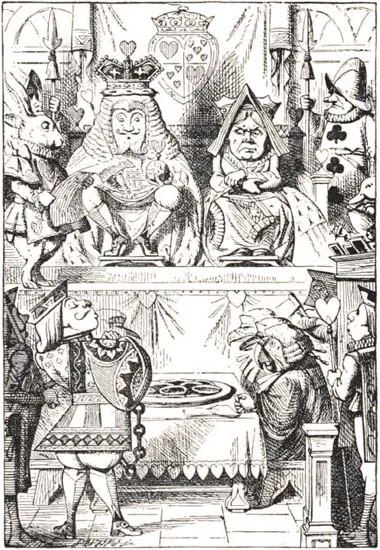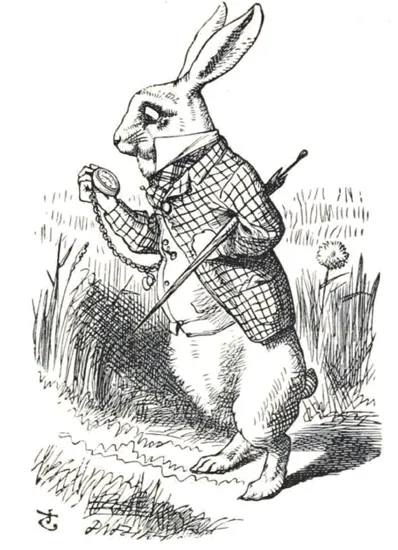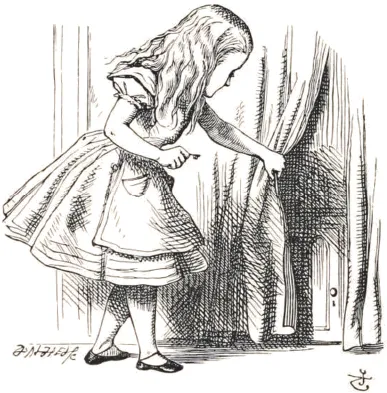
eBook - ePub
Available until 18 May |Learn more
Alice's Adventures in Wonderland (Wisehouse Classics - Original 1865 Edition with the Complete Illustrations by Sir John Tenniel)
This book is available to read until 18th May, 2026
- 79 pages
- English
- ePUB (mobile friendly)
- Available on iOS & Android
eBook - ePub
Available until 18 May |Learn more
Alice's Adventures in Wonderland (Wisehouse Classics - Original 1865 Edition with the Complete Illustrations by Sir John Tenniel)
About this book
ALICE'S ADVENTURES IN WONDERLAND (commonly shortened to Alice in Wonderland) is an 1865 novel written by English author Charles Lutwidge Dodgson under the pseudonym Lewis Carroll. It tells of a girl named Alice falling through a rabbit hole into a fantasy world populated by peculiar, anthropomorphic creatures. The tale plays with logic, giving the story lasting popularity with adults as well as with children. It is considered to be one of the best examples of the literary nonsense genre. Its narrative course and structure, characters and imagery have been enormously influential in both popular culture and literature, especially in the fantasy genre.
Dodgson's tale was published in 1865 as Alice's Adventures in Wonderland by "Lewis Carroll" with illustrations by John Tenniel. The first print run of 2,000 was held back because Tenniel objected to the print quality. A new edition was quickly printed, released in December of the same year but carrying an 1866 date.
The entire print run sold out quickly. Alice was a publishing sensation, beloved by children and adults alike. Among its first avid readers were Queen Victoria and the young Oscar Wilde. The book has never been out of print. Alice's Adventures in Wonderland has been translated into at least 174 languages. There have now been over a hundred English-language editions of the book, as well as countless adaptations in other media, especially theatre and film.
Dodgson's tale was published in 1865 as Alice's Adventures in Wonderland by "Lewis Carroll" with illustrations by John Tenniel. The first print run of 2,000 was held back because Tenniel objected to the print quality. A new edition was quickly printed, released in December of the same year but carrying an 1866 date.
The entire print run sold out quickly. Alice was a publishing sensation, beloved by children and adults alike. Among its first avid readers were Queen Victoria and the young Oscar Wilde. The book has never been out of print. Alice's Adventures in Wonderland has been translated into at least 174 languages. There have now been over a hundred English-language editions of the book, as well as countless adaptations in other media, especially theatre and film.
Frequently asked questions
Yes, you can cancel anytime from the Subscription tab in your account settings on the Perlego website. Your subscription will stay active until the end of your current billing period. Learn how to cancel your subscription.
No, books cannot be downloaded as external files, such as PDFs, for use outside of Perlego. However, you can download books within the Perlego app for offline reading on mobile or tablet. Learn more here.
Perlego offers two plans: Essential and Complete
- Essential is ideal for learners and professionals who enjoy exploring a wide range of subjects. Access the Essential Library with 800,000+ trusted titles and best-sellers across business, personal growth, and the humanities. Includes unlimited reading time and Standard Read Aloud voice.
- Complete: Perfect for advanced learners and researchers needing full, unrestricted access. Unlock 1.4M+ books across hundreds of subjects, including academic and specialized titles. The Complete Plan also includes advanced features like Premium Read Aloud and Research Assistant.
We are an online textbook subscription service, where you can get access to an entire online library for less than the price of a single book per month. With over 1 million books across 1000+ topics, we’ve got you covered! Learn more here.
Look out for the read-aloud symbol on your next book to see if you can listen to it. The read-aloud tool reads text aloud for you, highlighting the text as it is being read. You can pause it, speed it up and slow it down. Learn more here.
Yes! You can use the Perlego app on both iOS or Android devices to read anytime, anywhere — even offline. Perfect for commutes or when you’re on the go.
Please note we cannot support devices running on iOS 13 and Android 7 or earlier. Learn more about using the app.
Please note we cannot support devices running on iOS 13 and Android 7 or earlier. Learn more about using the app.
Yes, you can access Alice's Adventures in Wonderland (Wisehouse Classics - Original 1865 Edition with the Complete Illustrations by Sir John Tenniel) by Lewis Carrol,Sir John Tenniel, Sam Vaseghi in PDF and/or ePUB format, as well as other popular books in Literature & Classics. We have over one million books available in our catalogue for you to explore.
Information

All in the golden afternoon Full leisurely we glide; For both our oars, with little skill, By little arms are plied, While little hands make vain pretence Our wanderings to guide. | Anon, to sudden silence won, In fancy they pursue The dream-child moving through a land Of wonders wild and new, In friendly chat with bird or beast – And half believe it true. |
Ah, cruel Three! In such an hour, Beneath such dreamy weather, To beg a tale of breath too weak To stir the tiniest feather! Yet what can one poor voice avail Against three tongues together? | And ever, as the story drained The wells of fancy dry, And faintly strove that weary one To put the subject by, “The rest next time –” “It is next time!” The happy voices cry. |
Imperious Prima flashes forth Her edict ‘to begin it’ – In gentler tone Secunda hopes ‘There will be nonsense in it!’ – While Tertia interrupts the tale Not more than once a minute. | Thus grew the tale of Wonderland: Thus slowly, one by one, Its quaint events were hammered out – And now the tale is done, And home we steer, a merry crew, Beneath the setting sun. |
Alice! a childish story take,
And with gentle hand
Lay it were Childhood’s dreams are twined
In Memory’s mystic band,
Like pilgrim’s wither’d wreath of flowers
Pluck’d in a far-off land.

Chapter I
Down the Rabbit-Hole
Down the Rabbit-Hole
ALICE was beginning to get very tired of sitting by her sister on the bank, and of having nothing to do: once or twice she had peeped into the book her sister was reading, but it had no pictures or conversations in it, ‘and what is the use of a book,’ thought Alice ‘without pictures or conversation?’
So she was considering in her own mind (as well as she could, for the hot day made her feel very sleepy and stupid), whether the pleasure of making a daisy-chain would be worth the trouble of getting up and picking the daisies, when suddenly a White Rabbit with pink eyes ran close by her.
There was nothing so very remarkable in that; nor did Alice think it sovery much out of the way to hear the Rabbit say to itself, ‘Oh dear! Oh dear! I shall be late!’ (when she thought it over afterwards, it occurred to her that she ought to have wondered at this, but at the time it all seemed quite natural); but when the Rabbit actually took a watch out of its waistcoat-pocket, and looked at it, and then hurried on, Alice started to her feet, for it flashed across her mind that she had never before seen a rabbit with either a waistcoat-pocket, or a watch to take out of it, and burning with curiosity, she ran across the field after it, and fortunately was just in time to see it pop down a large rabbit-hole under the hedge.
In another moment down went Alice after it, never once considering how in the world she was to get out again.
The rabbit-hole went straight on like a tunnel for some way, and then dipped suddenly down, so suddenly that Alice had not a moment to think about stopping herself before she found herself falling down a very deep well.
Either the well was very deep, or she fell very slowly, for she had plenty of time as she went down to look about her and to wonder what was going to happen next. First, she tried to look down and make out what she was coming to, but it was too dark to see anything; then she looked at the sides of the well, and noticed that they were filled with cupboards and book-shelves; here and there she saw maps and pictures hung upon pegs. She took down a jar from one of the shelves as she passed; it was labelled ‘ORANGE MARMALADE’, but to her great disappointment it was empty: she did not like to drop the jar for fear of killing somebody, so managed to put it into one of the cupboards as she fell past it.
‘Well!’ thought Alice to herself, ‘after such a fall as this, I shall think nothing of tumbling down stairs! How brave they’ll all think me at home! Why, I wouldn’t say anything about it, even if I fell off the top of the house!’ (Which was very likely true.)
Down, down, down. Would the fall never come to an end! ‘I wonder how many miles I’ve fallen by this time?’ she said aloud. ‘I must be getting somewhere near the centre of the earth. Let me see: that would be four thousand miles down, I think —’ (for, you see, Alice had learnt several things of this sort in her lessons in the schoolroom, and though this was not a very good opportunity for showing off her knowledge, as there was no one to listen to her, still it was good practice to say it over) ‘— yes, that’s about the right distance — but then I wonder what Latitude or Longitude I’ve got to?’ (Alice had no idea what Latitude was, or Longitude either, but thought they were nice grand words to say.)
Presently she began again. ‘I wonder if I shall fall right through the earth! How funny it’ll seem to come out among the people that walk with their heads downward! The Antipathies, I think —’ (she was rather glad there was no one listening, this time, as it didn’t sound at all the right word) ‘— but I shall have to ask them what the name of the country is, you know. Please, Ma’am, is this New Zealand or Australia?’ (and she tried to curtsey as she spoke — fancy curtseying as you’re falling through the air! Do you think you could manage it?) ‘And what an ignorant little girl she’ll think me for asking! No, it’ll never do to ask: perhaps I shall see it written up somewhere.’
Down, down, down. There was nothing else to do, so Alice soon began talking again. ‘Dinah’ll miss me very much to-night, I should think!’ (Dinah was the cat.) ‘I hope they’ll remember her saucer of milk at tea-time. Dinah my dear! I wish you were down here with me! There are no mice in the air, I’m afraid, but you might catch a bat, and that’s very like a mouse, you know. But do cats eat bats, I wonder?’ And here Alice began to get rather sleepy, and went on saying to herself, in a dreamy sort of way, ‘Do cats eat bats? Do cats eat bats?’ and sometimes, ‘Do bats eat cats?’ for, you see, as she couldn’t answer either question, it didn’t much matter which way she put it. She felt that she was dozing off, and had just begun to dream that she was walking hand in hand with Dinah, and saying to her very earnestly, ‘Now, Dinah, tell me the truth: did you ever eat a bat?’ when suddenly, thump! thump! down she came upon a heap of sticks and dry leaves, and the fall was over.
Alice was not a bit hurt, and she jumped up on to her feet in a moment: she looked up, but it was all dark overhead; before her was another long passage, and the White Rabbit was still in sight, hurrying down it. There was not a moment to be lost: away went Alice like the wind, and was just in time to hear it say, as it turned a corner, ‘Oh my ears and whiskers, how late it’s getting!’ She was close behind it when she turned the corner, but the Rabbit was no longer to be seen: she found herself in a long, low hall, which was lit up by a row of lamps hanging from the roof.
There were doors all round the hall, but they were all locked; and when Alice had been all the way down one side and up the other, trying every door, she walked sadly down the middle, wondering how she was ever to get out again.

Suddenly she came upon a little three-legged table, all made of solid glass; there was nothing on it except a tiny golden key, and Alice’s first thought was that it might belong to one of the doors of the hall; but, alas! either the locks were too large, or the key was too small, but at any rate it would not open any of them. However, on the second time round, she came upon a low curtain she had not noticed before, and behind it was a little door about fifteen inches high: she tried the little golden key in the lock, and to her great delight it fitted!
Alice opened the door and found that it led into a small passage, not much larger than a rat-hole: she knelt down and looked along the passage into the loveliest garden you ever saw. How she longed to get out of that dark hall, and wander about among those beds of bright flowers and those cool fountains, but she could not even get her head through the doorway; ‘and even if my head would go through,’ thought poor Alice, ‘it would be of very little use without my shoulders. Oh, how I wish I could shut up like a telescope! I think I could, if I only know how to begin.’ For, you see, so many out-of-the-way things had happened lately, t...
Table of contents
- Cover
- Half-Title Page
- Title Page
- Copyright
- Table of Contents
- Chapter I: Down the Rabbit-Hole
- Chapter II: The Pool of Tears
- Chapter III: A Caucus-Race and a Long Tale
- Chapter IV: The Rabbit Sends in a Little Bill
- Chapter V: Advice from a Caterpillar
- Chapter VI: Pig and Pepper
- Chapter VII: A Mad Tea-Party
- Chapter VIII: The Queen’s Croquet-Ground
- Chapter IX: The Mock Turtle’s Story
- Chapter X: The Lobster Quadrille
- Chapter XI: Who Stole the Tarts?
- Chapter XII: Alice’s Evidence